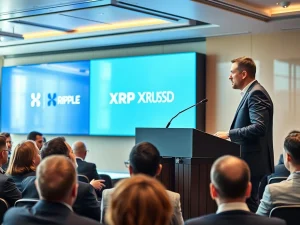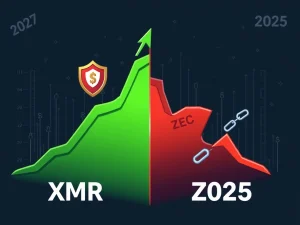BBVA Makes Bold Move: Spanish Bank Recommends 7% Crypto Allocation

Major financial institutions are increasingly looking at digital assets. In a significant development, **BBVA**, the second-largest bank in Spain, is now advising its wealthy clients on **crypto allocation** within their **investment portfolio**.
What is BBVA Recommending for Crypto Allocation?
According to reports citing a BBVA executive, the bank is suggesting that affluent clients consider allocating between 3% and 7% of their portfolio to crypto assets, including **Bitcoin** (BTC). This recommendation depends on the client’s risk tolerance, with higher allocations suggested for those comfortable with more risk.
Philippe Meyer, head of digital and blockchain solutions at BBVA Switzerland, stated that the bank began advising on Bitcoin for private customers in late 2024 and has since increased the potential allocation for riskier profiles. He noted that clients have been receptive to this advice.
Why is BBVA Making This Move Now?
BBVA’s move follows its recent regulatory approval in Spain to offer crypto trading services. The bank has been involved in crypto trading since 2021 but shifted to active advisory services more recently. This positions BBVA ahead of many traditional banks in Europe.
Key points regarding BBVA’s expansion:
- Received permission from Spain’s securities regulator in March to offer Bitcoin (BTC) and Ether (ETH) trading in the country.
- Launched crypto offerings in a phased rollout, initially to select clients.
- Plans to enable users to buy, sell, and manage digital assets via its mobile app soon.
How Does This Fit with the Regulatory Landscape?
BBVA’s decision comes despite ongoing warnings from European Union regulators and the European Central Bank about crypto risks. The European Securities and Markets Authority (ESMA) has indicated that most EU banks are still avoiding crypto activities.
The European Markets in Crypto-Assets Regulation (MiCA) reached full implementation at the end of 2024, providing a clearer framework for the crypto industry in the EU. EU crypto companies have until July 2026 to become fully compliant with MiCA’s requirements under a transitional phase.
Are Other Spanish Banks Exploring Crypto?
Yes, other major banks are also exploring the crypto space. For example, Santander is reportedly considering issuing its own stablecoin and expanding retail crypto services. This suggests a broader trend among **Spanish bank** institutions to engage with digital assets, albeit at different paces and focuses.
What’s the Potential Impact on an Investment Portfolio?
According to BBVA’s Philippe Meyer, introducing even a 3% allocation to crypto can boost a balanced portfolio’s performance without adding excessive risk. This perspective highlights the potential diversification benefits that digital assets like **Bitcoin** might offer within a traditional **investment portfolio**.
Summary: A Glimpse into the Future?
BBVA’s recommendation for **crypto allocation**, advising up to 7% for affluent clients, is a notable step for a major **Spanish bank**. It signals a growing acceptance of digital assets within traditional finance, even amidst regulatory caution. As institutions like **BBVA** and Santander continue to explore and integrate crypto services, it suggests a potential shift in how wealth management and **investment portfolio** strategies might evolve, potentially increasing mainstream exposure to assets like **Bitcoin**.










